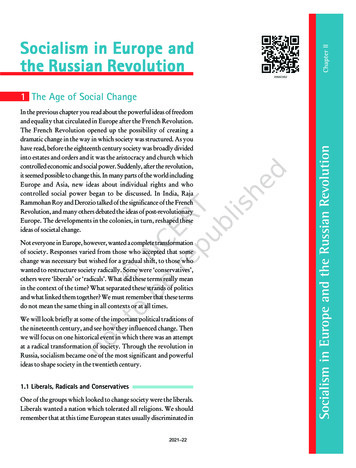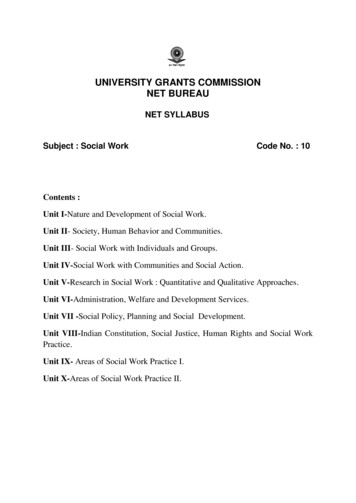
Transcription
SOCIALISMTHE FAILED IDEA THAT NEVER DIESKRISTIANNIEMIETZ
Socialism: The Failed Idea That Never Dies
SOCIALISM: THE FAILED IDEATHAT NEVER DIESKRISTIAN NIEMIETZ
First published in Great Britain in 2019 byThe Institute of Economic Affairs2 Lord North StreetWestminsterLondon SW1P 3LBin association with London Publishing Partnership Ltdwww.londonpublishingpartnership.co.ukThe mission of the Institute of Economic Affairs is to improve understandingof the fundamental institutions of a free society by analysing and expoundingthe role of markets in solving economic and social problems.Copyright The Institute of Economic Affairs 2019The moral rights of the authors have been asserted.All rights reserved. Without limiting the rights under copyright reservedabove, no part of this publication may be reproduced, stored or introducedinto a retrieval system, or transmitted, in any form or by any means (electronic, mechanical, photocopying, recording or otherwise), without the priorwritten permission of both the copyright owner and the publisher of this book.A CIP catalogue record for this book is available from the British Library.ISBN 978-0-255-36771-4 (interactive PDF)Many IEA publications are translated into languages otherthan English or are reprinted. Permission to translate or to reprintshould be sought from the Director General at the address above.Typeset in Kepler by T&T Productions Ltdwww.tandtproductions.com
The red flag of international Socialism waves from thepalace and from all the public buildings of Berlin. [ ][O]ur long years of toil and battling for the righteouscause of the people are now crowned with success. Theold rotten regime, with its [ ] system of plundering theworking classes, has crumbled to pieces. And for thebenefit of my children, and children's children, I intendto set down, in a humble way, some little account of thebeginning of this new reign of brotherhood and universalphilanthropy.Eugen RichterPictures of the Socialistic Future (1893: Chapter 1)An order has just been issued to reduce the bread rationsof the entire population by one half, and to do away withthe meat rations altogether. [ ] I find I shall henceforthbe no longer able to give the same full account of eventsas they happen. The twelve hours day comes into forcetomorrow, so I shall then not have much time for writing. [ ] I notice that I am regarded with such increasingsuspicion that a search might be made, and my papersconfiscated at any moment.Eugen RichterPictures of the Socialistic Future (1893: Chapter 32)
CONTENTSAbout the author Summary Tables and figures 123The enduring appeal of socialism xxixviii1Introduction: socialism is popular The pervasiveness of socialist assumptions Socialism and social democracy A lazy straw man? Not for a lack of trying The straw men that were once alive 11017213454The Soviet Union under Stalin: ‘A wholenation marched behind a vision’ 59Soviet socialism Stalin’s pilgrims Remnants of Soviet apologetics today Conclusion 59638694China under Mao Tse-Tung: ‘A revolutionaryregime must get rid of a certain number ofindividuals that threaten it’ Maoist socialism 100100vii
C ontentsMao’s pilgrims Remnants of Maoist apologetics today Conclusion 45Cuba under Fidel Castro: ‘The beginning ofbuilding the new man’ 116¡Hasta Siempre, Comandante! Castro’s pilgrims Why is Cuba different? 116120128North Korea under Kim Il Sung: ‘A messiahrather than a dictator’ North Korean socialism Kim Il Sung’s pilgrims Remnants of North Korea apologetics today 1321321331466Cambodia under the Khmer Rouge:‘The kingdom of justice’ 1557Albania under Enver Hoxha: ‘The workingclass is in power’ 1778East Germany under the SED: ‘The organisedmight of the working class’ 184East German socialism Western admirers of the GDR: the early years Western admirers of the GDR: the later years Remnants of GDR apologetics today A note on pro-GDR revisionism viii102112114184190198205212
C ontents9Venezuela under Hugo Chávez: ‘A different,and a better way of doing things. It’s calledsocialism’ 217Socialism of the twenty-first century Chávez’s pilgrims After the zenith Coming full circle The aftermath: not real socialism – again 21723224024725310 Why socialist ideas persist Haidt’s social intuitionist model and Caplan’s theoryof ‘rational irrationality’ Intuitive anti-capitalism, or anti-capitalism as adefault position The Gary Lineker fallacy Conclusion 26026027828729311 EpilogueAn alternative history: real socialism is beingtried 304References 360About the IEA 374ix
ABOUT THE AUTHORDr Kristian Niemietz is Head of Political Economy at theInstitute of Economic Affairs. He studied economics atthe Humboldt University Berlin and the University of Salamanca, and political economy at King’s College London.Kristian previously worked at the Berlin-based Institutefor Free Enterprise (IUF) and taught economics at King’sCollege London. He is the author of the books A New Understanding of Poverty (2011), Redefining the Poverty Debate(2012) and Universal Healthcare Without the NHS (2016).x
SUMMARYSocialism is popular in the UK – not just among students,but also among people in their 30s and 40s. This is confirmed by survey after survey. Surveys also show that support for socialism in general terms is matched by supportfor a broad range of individual policies that could reasonably be described as socialist.Curiously, support for socialism in the abstract is notmatched by positive perceptions of any actual example,contemporary or historical, of a socialist system in action.People with a rose-tinted view of, for example, the formerWarsaw Pact countries, of Maoist China, of North Vietnamor North Korea are a small minority in Britain today. Socialists have successfully distanced themselves from theover two dozen failed attempts to build a socialist society.Their claim that these systems were never ‘really’ socialist,but represented a distortion of the socialist ideal, has become conventional wisdom. Today, holding the failures of,for example, the former Soviet Union against a contemporary socialist is considered crass and boorish.Yet while socialists distance themselves from contemporary and historical examples of socialism, they usuallystruggle to explain what exactly they would do differently. Socialists tend to escape into abstraction, and talkabout lofty aspirations rather than tangible institutionalxi
S ummarycharacteristics. Those aspirations (for example, ‘democratising the economy’), however, are nothing new. They arethe same aspirations that motivated earlier socialist projects. Socialism has never fulfilled those aspirations, butthis is not for a lack of trying.The not-real-socialism defence is only ever invokedretrospectively, namely, when a socialist experiment hasalready been widely discredited. As long as a socialistexperiment is in its prime, almost nobody disputes its socialist credentials. On the contrary: practically all socialistregimes have gone through honeymoon periods, duringwhich they were enthusiastically praised and held up asrole models by plenty of prominent Western intellectuals.It is only after the event (i.e. once they have become an embarrassment for the socialist cause) that their version ofsocialism is retroactively redefined as ‘unreal’.This pattern started in the 1930s, when thousands ofWestern intellectuals went on political pilgrimages to theSoviet Union. Even though the atrocities of that regimewere widely known – or at least knowable – in the West,the Soviet Union was widely held up to be a worker-rungrassroots democracy in the making. When ‘Stalin-mania’later fell out of fashion, most of Stalin’s Western admirersdid not officially renounce their position, but simply fellsilent on the issue.In the 1960s, the same thing happened again, exceptthat this time, Cuba, North Vietnam, and above all, MaoistChina, became the utopias du jour. Echoing the earlier waveof pilgrimages to the Soviet Union, Western intellectualsflocked to these places in large numbers and returned fullxii
S ummaryof praise. The new utopias were presented as an alternativeto Western capitalism on the one hand, but also to the discredited socialism of the Soviet Union and its allies on theother hand. The ‘this-time-is-completely-different’ is notremotely new: since the 1960s, Western intellectuals haveexplicitly defined all new socialist experiments in opposition to earlier, failed attempts.When Cuba, Vietnam and Maoist China fell out of fashion in the 1970s, Albania and Cambodia took their place.The scale of the pilgrimages was tiny this time, but thebasic pattern was the same: Western admirers claimedthat while earlier socialist experiments had been corrupted, this time, a genuine workers’ and peasants’ democracy would emerge. Due to their extreme isolationism,these countries were not tainted by associations with discredited versions of socialism.The two most obvious natural experiments of socialismare the splitting of Korea and Germany into a socialist anda broadly capitalist part. It is clear today that these experiments have produced conclusive results – but this was notalways so clear, and, as long as the jury was out, plenty ofWestern intellectuals sympathised with the socialist rather than the capitalist parts of these countries.The most recent example of the above-described pattern – enthusiastic endorsement, followed by retroactivedisowning – is Venezuela. ‘Venezuela-mania’ startedaround 2005, and once again the central claim was thatthis time would be completely different: ‘21st centurysocialism’ would be a democratic bottom-up socialism,which had nothing in common with the authoritarianxiii
S ummarytop-down socialism of yesteryear. Venezuela soon founditself swamped by Western pilgrims. With Venezuela’sdescent into economic chaos, political unrest and authoritarianism, Venezuela-mania began to fade not long afterChávez’s death. After a period of silence, Western socialists began to explicitly dispute the socialist credentials ofChavismo. Venezuela is joining a long list of countries thatwere never ‘really’ socialist.Despite its long list of failures, socialism remains farmore popular than capitalism. The research of JonathanHaidt, which shows that most political and moral reasoning is about finding post-hoc justifications for an initial intuitive judgement, goes a long way towards explaining whythis is the case. The case for capitalism is counterintuitive:to most of us, capitalism simply feels wrong. Socialism, incontrast, chimes with our moral intuitions. Socialism simply feels right. Being a socialist is a ‘default opinion’, whichcomes easily and naturally to us. Appreciating the benefitsof a market economy, in contrast, takes some intellectualself-discipline. Even prominent free-market intellectuals,such as Milton Friedman and F. A. Hayek, did not starttheir careers as free marketeers.xiv
We can’t concede the end of communism. Communismhasn’t been tried on a society-wide basis.Professor Stephen Resnick, University of MassachusettsThere hasn’t been a shred of socialism in the Soviet Union.[ ] It’s got nothing to do with socialism.Professor Noam Chomsky (n. d.)Socialism is a good idea, which has just been badlyimplemented.From a 2002 survey in east Germany;82 per cent of respondents agreed.A socialist society [ ] doesn’t exist yet, but one day it must.Owen Jones (2016)The primary lesson here is not about [ ] ‘socialism’ or even‘communism’ since Castro, Mao, Stalin, and Lenin did notactually attempt to implement [ ] those ideas.Nathan Robinson (Current Affairs) (2017)Socialism has never been tried.The Socialist Party of Great Britain (1999)The struggle between communism and capitalism neverhappened. The Soviets didn’t establish communism.Professor Richard Wolff, University of Massachusetts
China and Cuba, like the former Soviet Union and EasternBloc, have nothing to do with socialism.The International Socialist Organization (n.d.)Socialism [ ] has not failed, because it has not begun yet.United Left [East German opposition group] (1990)The Stalinist bureaucracy of [East Germany] [ ] discredited the idea of socialism. We, the Spartacists, say: Socialism, under the real leadership of the working class, has noteven begun yet.Spartakist-Arbeiterpartei Deutschlands[East German opposition party] (1990)[T]here is no country in the world today that I would describe as socialist.Eric Ruder, Socialist Worker (2010)[W]hy do we blame socialism? It is not the ideology thatis at work here [in Venezuela], just like socialism wasn’tpracticed during the Soviet Union [ ] If Maduro and hisgovernment truly fulfilled the stated values of egalitariandemocratic socialism, people wouldn’t be starving.Ryan Beitler (2017)
[A]fter seventy years of experience with socialism, it is safeto say that most intellectuals [ ] remain [ ] unwilling towonder whether there might not be a reason why socialism, as often as it is attempted, never seems to work outas its intellectual leaders intended. The intellectuals’ vainsearch for a truly socialist community [ ] results in theidealisation of, and then disillusionment with, a seeminglyendless string of ‘utopias’ – the Soviet Union, then Cuba,China, Yugoslavia, Vietnam, Tanzania, Nicaragua.F. A. Hayek (1988)
TABLES AND FIGURESTable 1Table 2Support for regulation Distribution of seats in the new People’sChamber Figure 1Figure 2Figure 3Figure 4Figure 5Figure 6Support for public ownership by sector (in %) 3Support for public ownership by sector (in %) 4Support for price controls by sector (in %) 5Support for a larger state (in %) 7Economic Freedom scores 19GDP per capita (PPP), People’s Republic ofChina vs. Republic of China (Taiwan), 1980–2017 111Poverty in China, 1981–2013 (poverty line 3.10 PPP per day) 111GDP per capita (PPP), Albania vs. Romaniaand Bulgaria, 1985–2017 (in currentinternational ) 178GDP per capita (PPP) in Chile and Venezuela,1980–2016 222Oil prices in current US, 1989–2017, bypresidency 224Key governance indicators, 2000–2015 226Figure 7Figure 8Figure 9Figure 10Figure 11xviii6310
Tables and figuresFigure 12 Global GDP per capita over time (in constantinternational 1990 ) Figure 13 Global population and global poverty,1850–2010 Figure 14 Global average life expectancy at birth(years), 1870–2015 Figure 15 Annual number of hours worked per worker 279280281282xix
1THE ENDURING APPEAL OF SOCIALISMIntroduction: socialism is popularSupport for socialism in the abstractSocialism is popular in Britain. Not just among millennials, but also among people in their 30s and 40s. Accordingto a YouGov (2016a) survey, two in five British people agedbetween 18 and 50 years have a favourable opinion of socialism. Another two in five are not sure, leaving only onein five with an unfavourable opinion. Capitalism, meanwhile, has far more critics than supporters in the same agegroup; in fact, it has more critics than supporters acrossall age groups.1In a similar survey, 43 per cent of respondents said thathaving ‘a genuinely socialist government’ would make theUK ‘a better place to live’ (YouGov 2017a). One in five respondents were indifferent or unsure, leaving only 36 per cent whothought that it would make the UK ‘a worse place to live’.1Disapproval of one system does not automatically mean approval of theother. It is possible to be opposed to both, either as a form of nihilism (‘allsystems are bad’), or combined with advocacy of something else entirely.Among those over the age of 65, there is net disapproval of both socialismand capitalism.1
S ocialism : T he Failed I dea T hat N ever DiesIn a complementary survey, only 29 per cent of peoplebetween the ages of 18 and 50 agreed with the statement‘Competition among private-sector companies increasesliving standards for the great majority of people, as it leadsto new and better goods and services, creates extra jobsand keeps down prices’ (YouGov 2017b). But as many as37 per cent agreed with the opposite statement, namely‘Competition among private-sector companies reducesthe living standards of millions of people, because it helpsmainly the rich, leads to poverty wages for many workers,and often results in shoddy goods and services.’ (The remainder answered ‘Don’t know’.)Those findings are corroborated by a recent Populussurvey, which asked respondents about their main associations with capitalism, socialism and various other -isms.Common associations with capitalism include ‘greedy’,‘selfish’, ‘corrupt’ and ‘divisive’ (but also ‘innovative’). Common associations with socialism include ‘For the greatergood’, ‘Delivers most for most people’ and ‘Fair’, termsthat almost nobody in Britain associates with capitalism(Legatum Institute 2017). The most common negativeassociation with socialism is ‘naïve’, a trait which is notreally all that negative, and which some may actually findendearing.222Curiously, while the survey shows positive associations with the term ‘socialism’, it also shows negative associations with the term ‘communism’. Ifwe take the dictionary meaning of those terms at face value, this makes nosense: you cannot logically combine a positive view of socialism with a negative view of communism. In Marxist theory, ‘communism’ is simply thehypothetical final stage of socialism, the stage that is reached when socialism is so advanced that it no longer requires a state apparatus. Presumably,
T he enduring appeal of socialismSupport for socialist policiesTerms like ‘socialism’ and ‘capitalism’ may mean differentthings to different people. But support for socialism in theabstract is also matched by support for individual policiesthat could reasonably be described as ‘socialist’, perhapsnot on their own, but at least as a bundle.Figure 1Support for public ownership by sector (in %)100Public80Private604020–40–60NHSc ShoolRsoyalMaco Ra ilm ilwp a aynieW saterBBCEnBuerscogympaTenieslein phte onrn eet &BanksAirlines0–20–80Source: Based on YouGov (2017c).Industry nationalisations, for example, enjoy widespread popular support. A majority of people favour the(re-)nationalisation of bus companies, energy providers,water companies, the railways and Royal Mail (see Figure 1). Where a sector is already nationalised, such asprimary/secondary education and healthcare, there ismost survey participants associate the term ‘communism’ with the kind ofsocialism that actually existed in Eastern Europe and elsewhere, and theterm ‘socialism’ with the ideal, which, in the minds of many, has not beentainted by its messy real-world applications.3
S ocialism : T he Failed I dea T hat N ever Diesvirtually nobody in the country who wants to change that(YouGov 2017c).3 Earlier, similar surveys show even largerpro- nationalisation majorities for even more industries(YouGov 2016b, 2015a, 2013).Figure 2Support for public ownership by sector (in %)Public100Whatever eoPaSotRlsmsta&oPdsoaRSource: YouGov (2015b).ispoHlstaUtietilissnkBaAnother survey finds that one in four respondents wantto nationalise car companies and travel agents, while onein three want to nationalise food retailing (Legatum Institute 2017).4 Ian Dunt, the editor of Politics.co.uk, was right43Five per cent of respondents say that they want to privatise the NHS. Whileclearly a minority, this is, on the face of it, a lot more than ‘virtually nobody’.However, it is an idiosyncrasy of surveys that every option that is availablewill normally be chosen by at least some respondents. Scott Alexander(2013) calls this phenomenon the ‘Lizardman’s Constant’, a reference to aUS survey where people were asked whether they believe that the world isrun by intelligent lizardmen from outer space. Four per cent replied yes.4The numbers are not directly comparable to the YouGov surveys, becausethe Populus survey does not include a ‘Don’t know’ option.
T he enduring appeal of socialismwhen he said that ‘the public hardly believe in the privaterunning of anything’ (Dunt 2015).For most industries, the pro-nationalisation majorityremains intact even when surveys include an additional,pragmatic-sounding response option such as ‘whateverworks best’ (see Figure 2). This suggests that for most supporters of public ownership this is a matter of principlerather than a belief in the superior efficiency of the publicsector.Figure 3100806040200–20–40–60–80Support for price controls by sector (in %)SupportGas &electricityPublictransportRentsOpposeFood &groceriesSource: YouGov (2013).Price controls are also a very popular policy, a lbeitwith a lot of variation between sectors (see Figure 3).More than seven out of ten respondents support pricecaps for energy and public transport, with fewer thanone in five opposing. In this particular survey, supporters and opponents of rent controls roughly balance eachother, but more recent, similarly worded surveys on thesame subject find large majorities favouring rent controls (see Hilton 2016). There is no overall support for5
S ocialism : T he Failed I dea T hat N ever Dies enezuela-style price controls for food and groceries, butVa significant minority – more than one in three respondents – are in favour of that as well.Government regulation and interference with businessdecisions are also popular, both in the abstract and whenspecific examples are mentioned (see Table 1).Table 1Support for regulationDominant view‘The pay of senior execsshould be capped.’Minority view‘Businesses should paytheir senior execswhat they see fit.’Margin56%‘Government needs to do more to‘Government regulatesregulate how businesses behave.’businesses too much.’32%‘Zero hours contractsshould be abolished.’22%‘Zero hours contractsoffer useful work.’‘Companies have a responsibility‘It doesn’t matter ifto ensure they have a decentthere aren’t anynumber of workers at board level.’ workers on boards.’‘Link people’s pay to thevalue their jobs contributeto broader society.’‘Allow people to get whattheir employers/customersare willing to pay.’15%8%Legatum Institute (2017).A relative majority also supports a larger state, as opposed to the status quo or a smaller state (see Figure 4).The margin vis-à-vis the status quo is not huge, and it isnot consistent over the years. But it is a consistent findingthat virtually nobody in Britain wants the state to be anysmaller than it currently is.Most of these policies are not exceptionally radical ontheir own. A nationalised railway industry or capped busfares would not turn Britain into North Korea. We can find6
T he enduring appeal of socialismplenty of prosperous market economies which have implemented one or more of those policies (although none thathave implemented the whole package).Figure 4Support for a larger state (in %)6050403020100Increasetaxes andspend moreKeep taxesand spendingthe sameReducetaxes andspend lessSource: NatCen Social Research (2017).But what such results do show is that the often-heardclaim that Britain is in the grip of a ‘neoliberal hegemony’is the exact opposite of the truth. In the economic sphere,the zeitgeist is statist and interventionist. Support for freemarkets is an exotic and unpopular fringe opinion. AsAllister Heath, the editor of the Sunday Telegraph, puts it(2017):Spend more, regulate more, tax more: it’s UK politics’stultifying new orthodoxy. Its proponents [ ] set theparameters of our increasingly narrow national conversation. [ ] There is no longer a debate: merely a relentlessassault on capitalism [ ] amplified by ‘centrists’ whokeep conceding to the Left.7
S ocialism : T he Failed I dea T hat N ever DiesThe anti-capitalist mainstreamSurveys provide a glimpse into the mood among the general population. Among the politically most active sections of society, socialist – or at least anti-capitalist – ideashave long been predominant, and highly fashionable. Forexample, all high-profile protest movements in recentdecades – be it anti-austerity, Occupy or anti-globalisation – were explicitly anti-capitalist.5 In 2011, a small‘Rally Against Debt’ in Westminster attracted considerable media coverage, although it was, according to theNew Statesman, only attended by about 200 people.6 Thiswas because it was so counterintuitive. We are so used tothe idea that protest must be left-wing and anti-capitalistthat the idea of a protest against government largesse feelsjarring.Last but not least, the politics/economics sections ofhigh street book stores are also invariably dominated byanti-capitalist literature. The books of Naomi Klein, NoamChomsky, Slavoj Žižek, Yanis Varoufakis, Owen Jones,Ha-Joon Chang, Paul Mason, Russell Brand, etc., are bestsellers within their genre; pro-market books are a rarity.Writers such as Joseph Stiglitz, Paul Krugman or Thomas85This is, at least, the situation in the UK and the rest of Europe. In the US,the Tea Party could be considered a protest movement against governmentlargesse, although it is really a broader coalition in which the social conservatism probably outweighs the anti-statism.6Rally Against Debt? It was more of a long queue, New Statesman, 15 May s/2011/05/rally-cuts-debt-event-lisa-low).
T he enduring appeal of socialismPiketty are clearly politically on the centre-left, but inrelative terms their books are often the most ‘neoliberal’ones one can find in a typical high street bookstore. If thisconstitutes a ‘neoliberal hegemony’, one wonders what aleft-wing hegemony would look like.After the 2017 General Election, the Financial Timesclaimed that ‘Jeremy Corbyn has staged an unprecedented socialist revival’.7 He has done no such thing. Onecannot revive what has never been dead. Socialism hasnever been away; it has just not always been at the immediate forefront of day-to-day politics. It may havereturned there with ‘Corbyn-mania’, but the appeal ofsocialism was never about any one particular politicalcandidate, party or movement.Some readers will probably find it odd that althoughthis book is partly about socialism in Britain, it has nextto nothing to say on ‘Corbyn-mania’, Corbynomics, Momentum, etc. But this follows logically from the recognition that ‘Corbynistas’ are not the radical insurgents theythink themselves to be. They do not, and indeed could not,challenge ‘the prevailing orthodoxy’ because in manyways their ideas are the prevailing orthodoxy. They arejust a political manifestation of a widespread antipathyto the market economy, which long predates them, andwhich will outlive them, in whatever form. When Hayekdedicated his book The Road to Serfdom to the socialists7Jeremy Corbyn has staged an unprecedented socialist revival, FinancialTimes, 9 June 2017 4-c742b9791d43).9
S ocialism : T he Failed I dea T hat N ever Diesof all parties, he knew what he was doing. Today, he wouldprobably dedicate it to the socialists of all parties, protest movements, campaign groups, charities, universities,religious organisations, media outlets and social mediaplatforms.The pervasiveness of socialist assumptionsWhat is perhaps more important than support for anyspecific socialist policy or set of policies is the fact thatsocialist assumptions about economic life permeate ourwhole economic policy discourse. These assumptions arerarely spelt out explicitly, and most people would probablynot even regard them as ‘socialist’ – just as ‘common sense’.Take the above-mentioned support for nationalisingindustries, such as energy or train operators: this need not,in itself, be a socialist position. One can take the view thatmarket competition is generally beneficial, but that somesectors are just not amenable to it (say, due to naturalmonopoly elements). This is not a socialist argument. Butit is not the argument that is usually made.The conventional argument is that ‘profiteering corporations’ are ‘ripping off the public’, and must therefore benationalised in order to make them work for ‘the commongood’. They must be made accountable to the public ratherthan to private shareholders.8 Very few people will regard810For example: Rail privatisation: legalised larceny, The Guardian, 4 November 2013 v/04/rail-privatisation-train-operators-profit). For Tories, privatisation is still a
T he enduring appeal of socialismthis sentiment as ‘socialist’. But for at least four reasons, itvery much is.Firstly, average profit margins in the sectors where support for nationalisation is strongest are only about 3–4 percent.9 This suggests that the argument for nationalisationis not an economic argument at all, but a moralistic impulse – a knee-jerk condemnation of the profit motive. Thisanti-profit moralism is part of a socialist mindset.Secondly, the argument rests on the assumption thatthe public sector is driven by altruistic motives, and thattherefore, whatever is done by the state is done with ‘thecommon good’ in mind. This is a quintessentially socialistassumption. It is also, to say the least, debatable. As economists of the Public Choice School have demonstrated timeand again, self-interested behaviour exists in the public/political sphere as much as anywhere else: senior civilservants trying to expand their budgets and their remitin order to improve their prestige; rent seeking by specialinterest groups; political clientelism; ‘jobs for the boys’ tendencies, etc. (see, for example, Tullock 2006 [1976]).matter of dogmatic faith, Independent, 14 July 2013 f-dogmatic-faith-8708021.html).9The government’s ‘temporary’ energy price cap is bad economics, IEAblog, 19 October 2017 gy-price-cap-is-bad-economics/). Even these margins could notsimply be passed
Despite its long list of failures, socialism remains far more popular than capitalism. The research of Jonathan Haidt, which shows that most political and moral reason-ing is about finding post-hoc justifications for an initial in-tuitive judgement, goes a long way towards explai











